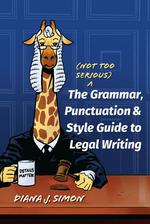It’s more than “read a lot” and “have a good ear.”
At a recent CLE talk, I said that implementing a certain technique would require “exercising editorial judgment.” A lawyer asked, “How do you develop editorial judgment?” In this column, I try to answer that question.
Note: This column is about words, sentences, paragraphs, and documents, not about substance and content, which are highly important in legal writing: Should I mention this fact? Should I include this topic [information, explanation, analysis, argument, counter-argument, policy, etc.]? Does my reader need more background—or less? And so on.
When you’re writing or editing a document for yourself or someone else, you end up making countless editorial decisions:
- Should I use a semicolon or a dash here?
- Should I use conversely, however, or but?
- Is this sentence too long? If so, where should I break it?
- Is this paragraph too long? If so, …
- Should I use three levels of headings and subheadings—or only two?
And so on. We make most of these decisions instinctively, yet in doing so, we may not realize that we’re relying on editorial judgment: a storehouse of knowledge about the way writing works. Plus, factored into all these judgments are the context, the audience, the constraints, and the goals of the writing. That’s a whole lot of judgment to exercise.
I’ll focus on developing good editorial judgment as to the words, sentences, paragraphs, and documents you write. Here are my five key recommendations:
Look things up.
Whenever you have even a small or innocuous-seeming question or concern about words, syntax, sentences, grammar, punctuation, or style, consult a source. The internet works (I like “Grammar Girl” Mignon Fogarty[1]), but I recommend keeping at hand some good reference manuals—books—including references specific to legal writing. I’ve cited five good ones in the footnote.[2]
Read about writing.
I often see “read good writing” offered as advice for learning to write well. It’s good advice. But the reading most of us do is to learn content or to be entertained. The kind of reading you should do to improve your editorial judgment requires more effort, more focus, more planning. For me, it’s not reference manuals like those I mentioned above, but engaging, well-written books about writing well. These books inform and strengthen your editorial judgment. I’ve listed five in the footnote.[3]
Write a lot.
This idea is built-in for most legal writers. The more writing you do in a professional context, the more experience you gain, and experience contributes to editorial judgment. But if all you do is write a lot, without looking things up and without reading about writing, you tend to rest on plateaus; you write the same way you always have—particularly if you’re operating with harsh deadlines and heavy workloads. So write a lot, but improve and inform your writing judgment by looking things up and reading about writing.
Edit, edit, edit.
Subject every serious writing project to edits aimed at effectively and precisely conveying the content, clearly presenting that content in an organized fashion, and thoroughly improving the text for concision, clarity, and correctness. You could develop editing protocols and practice them consistently. You could create editing checklists and revise them over time. You could work at completing drafts early so you have more time to edit—and more time away from the document, which always improves editing.
Seek critique.
Open yourself up to suggestions, comments, and critiques of your writing offered by those you trust and whose writing you respect. One sure way to stymie your editorial judgment is to write the way you always have without seeking input from others.
Those are my best recommendations. Good luck.
_____
[1] https://www.quickanddirtytips.com/grammar-girl/
[2] Deborah Bouchoux, Aspen Handbook for Legal Writers; Anne Enquist & Laurel Currie Oates, Just Writing: Grammar, Punctuation, and Style for the Legal Writer; Bryan A. Garner, Garner’s Dictionary of Legal Usage; Bryan A. Garner, The Redbook: A Manual on Legal Style; Texas Law Review, Manual on Usage & Style.
[3] Tom Goldstein & Jethro K. Lieberman, The Lawyer’s Guide to Writing Well; Ross Guberman, Point Made; Ross Guberman & Gary Karl, Deal Struck: The World’s Best Drafting Tips; Wayne Schiess, Legal Writing Nerd: Be One; Richard Wydick & Amy Sloan, Plain English for Lawyers.

